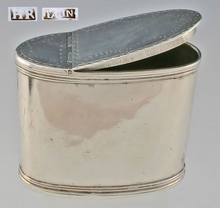Tain Through Time
History
Rosemary Mackenzie had been asked to organise an exhibition of local material for the celebration of the 900th anniversary of Tain's royal charter in 1966. The museum was established and Mackenzie became the museum's first curator. Mackenzie was particularly interested in the town's history and had for years been collecting items of local interest, especially after the re-organisation of local government in 1975 when much valuable material might have been re-located away from Tain. The growing collection was held in what had been the caretaker's cottage of the Old Collegiate Church, built in the 1880s.
The museum is the custodian of a papal bull from Innocent VIII dated 17 July 1492.
The museum is staffed by local volunteers and is open 1 April to 31 October.
Tain silver

From 2007 to 2013 the museum developed their collection of 18th and 19th century silver made in Tain. There was some support from the Art Fund. In 1997 Tain silver was the subject of the first exhibition mounted by the museum and included not only examples from the museum's own collection but also items from individual and corporate owners including one from the Royal Collection at Windsor. This example of Tain Silverwork was exhibited in the Empire Exhibition in Glasgow in 1938.
Other exhibits
The museum changes many of its exhibits each season. 2011 displays included:
- local Tain involvement with Highland regiments in the 18th and 19th centuries
- Transport in the 19th and 20th centuries: railways, shipping, roads, bicycles
- Tobacco, snuff and whisky, 17th to 20th centuries
- Croft houses and domestic life in Highland homes
- Tain Royal Academy & Education, 19th & 20th centuries
- New technology in the home, mid-20th century
Clan Ross Centre
The Tain & District Museum functions as the Clan Ross Centre and assists Rosses researching their clan roots. It tells the story of the clan down the centuries and links this to Clan Ross activities today. Information on the clan is available in a selection of books, DVDs together with other Ross mementos.
There was a large and active local East Ross population in Pictish times, (approximately 50BC to 900AD). They erected many carved stones which are now either standing in-place, displayed in Edinburgh, or preserved in Tain in the museum, such as the Ardjachie Stone.
A small part of the Nigg Stone is preserved in the museum.
Tain Through Time
The museum forms one part of the larger visitor centre on the site, the whole of which is called Tain Through Time. This centre includes the Collegiate Church and an old schoolhouse, now called The Pilgrimage, with a gallery illustrating King James IV pilgrimages to Tain.
Awards
In 1998 the museum was given an award as part of Hydro-Electric Scottish Museum of the Year Awards for the publication A Balance of Silver, a history of the old silversmiths of the Tain area.
References
- ^ "Rosemary Mackenzie, historian". The Scotsman. 25 March 2004. Retrieved 12 August 2020.
- ^ http://www.cali.co.uk/highexp/tain.asp "The museum is centred in the Caretakers Cottage", Scottish Provincial Press (Tain) webpage
- ^ http://www.archhighland.org.uk/news.asp?newsid=54 Tain & District Museum Precinct, Archeology for Communities in the Highlands website
- ^ Mackenzie, Jackie (11 February 2015). "Not just a load of old bull, says Tain Museum". North Star News. Retrieved 12 August 2020.
- ^ "Tain through Time". www.tain.org.uk. Tain Community Website. Retrieved 12 August 2020.
- ^ "Best to last pledge as Tain silver project comes to an end". The Ross-shire Journal. 20 May 2013. Retrieved 12 August 2020.
- ^ "Tain's silver comes home". The Ross-shire Journal. 4 April 2008. Retrieved 3 March 2017.
- ^ http://clanross.org/index.php?id=02_History_and_Ancestry/06_Tain_Museum.php Clan Ross archives at Tain & District Museum, Clan Ross website
- ^ http://www.greatclanross.org/2009Gathering3.html "The museum is home to Ross artifacts", Clan Ross website
- ^ Pictish carved stones near Tain "The Stones of the Pictish Peninsulas of Easter Ross and the Black Isle", D Scott, Historic Hilton Trust, 2004
- ^ The Ardjachie Stone, Ibid
- ^ "Museum wins historic acclaim". The Herald. 10 December 1998. Retrieved 12 August 2020.
External links
- Official website
- Castle Brae Museum on BritishListedBuildings.co.uk
- Tain & District Museum listing on VisitScotland.com